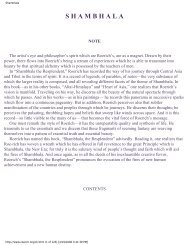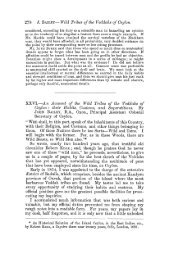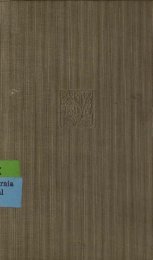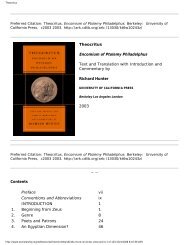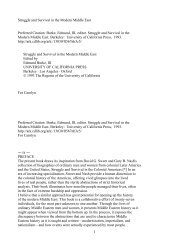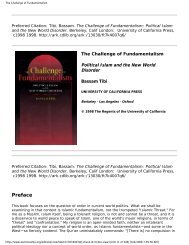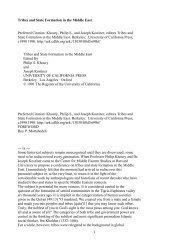Between Two Worlds Kafadar.pdf
Between Two Worlds Kafadar.pdf
Between Two Worlds Kafadar.pdf
Create successful ePaper yourself
Turn your PDF publications into a flip-book with our unique Google optimized e-Paper software.
who was no less than a descendant of the House of Chingis under the overlordship<br />
of the House of Osman.[60]<br />
Even though the century following the conquest of Constantinople may appear to<br />
have continued to be a glorious time for the Balkan gazis as one reads the gests<br />
(gazavatnames ) recording their deeds, it was a passing glory and was enjoyed<br />
only at the cost of increasing subservience to the central state. In 1457, for<br />
instance, when Mehmed II ordered a final assault on and capture of the Belgrade<br />
fortress, the frontier warriors of the Balkans protested. "If Belgrade is<br />
conquered," they said, according to Apz, "we will have to plow the land."[61]<br />
These gazis were obviously aware of where the central state's policy was<br />
leading. Even though they undertook numerous exploits and obtained substantial<br />
booty in the next few decades, they were increasingly reduced to provincial<br />
fief-holders, that is, agriculturalists, losing the last traces of their<br />
ancestors' status as mobile and independent frontier warriors. Just as with the<br />
nomads, the frontier warriors' activities were controlled and regularized, and<br />
they were tied to designated pieces of land in accordance with the<br />
administrative logic of the classical Ottoman order.<br />
Unfortunately, the rich cultural traditions and considerable literary as well as<br />
architectural patronage of the gazi milieu have not been sufficiently studied,<br />
crippling our understanding of some very significant developments involving the<br />
gazi circles in the fifteenth century.[62] Why did Prince Cem (1459-95)<br />
commission the collection of gazi lore built around the vita of Sari Saltuk ?<br />
His interest in things Turkish at a moment of an increasing turn to<br />
cosmopolitanism in Ottoman cultural life does not seem coincidental if we<br />
remember also that he named one of his sons Oguz . By that time, it was rare for<br />
members of the Ottoman family to receive Turkic names, and a symbolically<br />
charged name like Oguz stands out in particular.[63]<br />
In the Saltukname compiled for Prince Cem, various passages suggest that the<br />
book is intended to serve as a rapprochement between the Ottoman family, or that<br />
particular prince, and the gazi circles. It is reported here, for instance, that<br />
for four years the gazis of Rum struck coins and had the hutbe (Friday sermon)<br />
read in Saltuk's name — ultimate symbols of sovereignty, reflecting an audacious<br />
resistance to accepting Ottoman hegemony. Saltuk himself, however, is said to<br />
have disapproved of<br />
― 148 ―<br />
such action, accepted the superior right of the House of Osman in these matters,<br />
and invited all the gazis to gather around Osman's family. Saltukname suggests<br />
that at the time of its composition, ca. 1474, the gazis felt they were not<br />
getting a fair return for their services.<br />
Once again, the conquest of Constantinople and the making of that city into the<br />
capital, the seat of power, constitute the crucial moment in this regard became<br />
they represent the crystallization of a political vision that marginalizes the<br />
gazis. Much before the conquest, according to the narrative, which is written<br />
after Edirne lost its role as the capital, Saltuk visits that region and warns<br />
the Muslim rulers of the future:<br />
Whoever wishes to conquer [all of] the land of Rum , must be stationed in<br />
129




